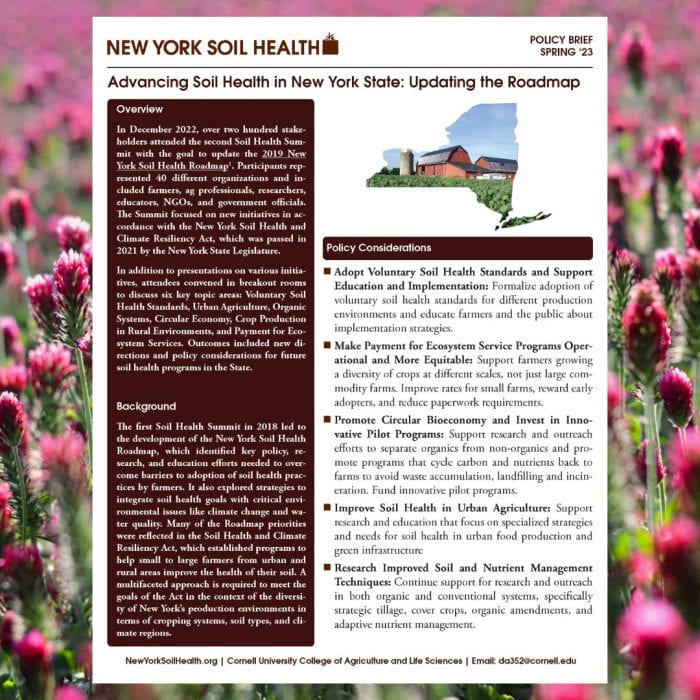By Kitty Gifford
New York Soil Health Summit outcomes highlight the significance of soil health initiatives in achieving sustainable agriculture goals in New York State.
Ithaca, NY – The New York Soil Health Team announces the outcomes and policy considerations arising from the second Soil Health Summit held in December 2022. Bringing together diverse stakeholders, including farmers, ag professionals, researchers, educators, NGOs, and government officials, the Summit aimed to update the 2019 New York Soil Health Roadmap and discuss new initiatives aligned with the New York Soil Health and Climate Resiliency Act, passed in 2021.
“The collaboration between Cornell University and stakeholders highlights the crucial role of scientific research in implementing effective soil health practices. With our combined expertise and resources, we are dedicated to achieving the objectives outlined in the new soil health law. Our collective efforts aim to foster sustainable agricultural practices, ensuring a productive and environmentally responsible agricultural sector,” said Harold van Es, professor in the School of Integrative Plant Science (SIPS) at Cornell University and co-leader of the New York State Soil Health initiative.
The Summit focused on six key topic areas: Voluntary Soil Health Standards, Urban Agriculture, Organic Systems, Circular Economy, Crop Production in Rural Environments, and Payment for Ecosystem Services. Attendees actively participated in discussions that resulted in valuable insights and recommendations for future soil health programs in the state.
Key outcomes from the Summit included:
- Voluntary Soil Health Standards: Stakeholders emphasized the need for scientifically based, fair, and effective standards that consider the diverse production environments across New York. Integrating these standards into certification frameworks will empower farmers to adopt soil health practices and market their successes.
- Payment for Ecosystem Services: Participants highlighted the importance of reasonable, equitable, and accessible policies and programs that incentivize farmers to embrace soil health practices. Supportive technologies and streamlined administrative processes are essential for the success of these programs.
- Circular Carbon and Nutrient Economy: Stakeholders proposed public-private partnerships to scale up practices that utilize domestic and agricultural “wastes” as resources to enhance soil health and sequester carbon. In addition, they emphasized the importance of integrating these practices into soil health initiatives at the local and state levels was emphasized.
- Urban Agriculture: Specialized strategies, research programs, and education were identified by participants as crucial for supporting sustainable food production and agroecosystem development in urban and peri-urban areas.
- Organic Systems: Initiatives were recommended to address challenges related to tillage, nutrient availability, weed and pest management, and knowledge transfer. Connecting nutrient sources with organic farms and assisting farmers in integrating soil health practices into management decisions were highlighted.
- Rural Environments: Ongoing research, education, and outreach are needed to mitigate soil erosion, nutrient leaching, improve farm resilience to climate change, and address water and air quality concerns in rural areas.
As the New York Soil Health project continues to drive sustainable agricultural practices, these outcomes and policy considerations will pave the way for a more resilient and environmentally conscious future for New York State. To access the complete policy brief and future New York Soil Health policy briefs, please visit:
A version of this story appeared in Morning AgClips.
